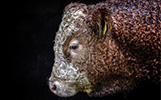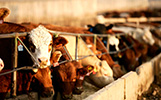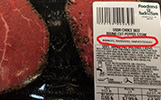| This story keeps coming back, in this case one of the authors of the Chatham house report repeating the message. There is still no sustained consistent reaction from the beef industry on this; there urgently needs to be concerted effort to balance some of the inaccuracies and half-truths that are repeated in such articles, and to which the general public are being constantly exposed without ever hearing that there is another side to this discussion.
Curbing Meat Consumption and Putting the Bite on Climate Change 
Antony Forggatt, BRINK | January 2, 2017
The world's current appetite for meat is excessive and constitutes a pattern of over consumption that is neither healthy nor sustainable. A growing global population cannot converge around the levels of meat consumption seen in industrialized economies without huge social and environmental cost.
Global consumption of meat is expected to increase 76 percent by 2050. Consumption in emerging and developing economies is rising fast and shows no sign of slowing, while meat-eating in industrialized countries has plateaued at excessive levels. Income levels are driving the increase, putting more meat on the table in developing countries. Among industrialized countries, the average person consumes around twice the maximum amount recommended by health experts. In the United States, it's three times as much.
Beefbooster: Not Just About the Bulls
Western Producer (subscription) | January 3, 2016
Beefbooster CEO Jennifer Stewart-Smith says emotion doesn't belong in the process of selecting a bull. "While the pedigree is important, the data available for Beefbooster bulls simplifies selection decisions. We have reliable data that allows producers to select bulls that meet the specific needs of their ranch, and suits their management style."
This is how Beefbooster began. Ranchers were looking for a way to use the data they had started to collect to improve results and predictability in their herds.
Just a Bad Patch? Or Is the Cattle Sector in Denial? 
Alexis Kienlen, Alberta Farmer Express | January 3, 2017
The cattle industry needs to stop patting itself on the back and face an uncomfortable truth — its grand plan to create a bright new future isn't yielding results.
That's the view of Charlie Gracey, one of Canada's most renowned experts on the beef industry. And all you have to do is look at the shrinking number of cattle and ranchers, said the former manager of Canadian Cattlemen's Association and Ontario Beef Producers.
Since 2009, the Canadian beef herd (total cows and calves) has declined by more than a million animals. It has also lost about 20 per cent of its producers in recent years."There's been an amazing cutback, and there's been very little comment about it," said Gracey. Every industry needs new blood and if the cattle sector wants to attract and retain young producers, it "has to create the conditions to make the industry profitable," he said.
Missing Facts in R–CALF, Tomi Lahren Videos 
Sean Cummins, ArgriLand | December 24, 2016
Social media is buzzing with a handful of videos featuring a popular, conservative news host interviewing the spokesman of a cattle organization in an effort to "make the American ranch community great again."
Tomi Lahren, a television host for the cable network TheBlaze, hosted Ranchers-Cattlemen Action Legal Fund, United Stockgrowers of America (R-CALF USA) CEO Bill Bullard on her program to discuss issues important to American beef producers. An initial 15-minute interview netted more than a half million views, while a shorter wrap up called "Final Thoughts with Tomi" has almost 2.6 million views. The two talked about the increasing market consolidation within the beef industry in the first segment. | |
